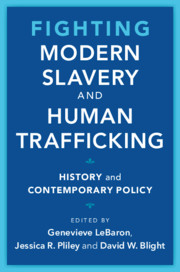Book contents
- Fighting Modern Slavery and Human Trafficking
- Slaveries since Emancipation
- Fighting Modern Slavery and Human Trafficking
- Copyright page
- Contents
- Figures
- Tables
- Contributors
- Preface
- Acknowledgments
- Abbreviations
- 1 Introduction
- 2 Counting Modern Slaves
- 3 Working Analogies
- 4 Free Soil, Free Produce, Free Communities
- 5 Ambivalent Abolitionist Legacies
- 6 Mexico’s New Slavery
- 7 Undermining Labor Power
- 8 A Market in Deception? Ethically Certifying Exploitative Supply Chains
- 9 Preventing Human Trafficking
- 10 Integrated and Indivisible
- Afterword If There Is No Struggle, There Is No Progress
- Index
6 - Mexico’s New Slavery
A Critique of Neo-abolitionism to Combat Human Trafficking (la trata de personas)
Published online by Cambridge University Press: 18 June 2021
- Fighting Modern Slavery and Human Trafficking
- Slaveries since Emancipation
- Fighting Modern Slavery and Human Trafficking
- Copyright page
- Contents
- Figures
- Tables
- Contributors
- Preface
- Acknowledgments
- Abbreviations
- 1 Introduction
- 2 Counting Modern Slaves
- 3 Working Analogies
- 4 Free Soil, Free Produce, Free Communities
- 5 Ambivalent Abolitionist Legacies
- 6 Mexico’s New Slavery
- 7 Undermining Labor Power
- 8 A Market in Deception? Ethically Certifying Exploitative Supply Chains
- 9 Preventing Human Trafficking
- 10 Integrated and Indivisible
- Afterword If There Is No Struggle, There Is No Progress
- Index
Summary
This chapter examines contemporary New Abolitionism as it redefined human trafficking law in Mexico. Until 2012, Mexico’s federal law understood human trafficking consistent with the United Nations protocol as action, means, and purpose. Under the ultra-right presidential administration of Felipe Calderón Hinojosa (2006–2012), New Abolitionists attained a level of national political influence and mounted a successful campaign to replace existing law with legislation defining human trafficking as slavery. New Abolitionists likewise framed human trafficking as a lucrative activity of drug cartel networks. Linking human trafficking to international organized crime fostered a new alliance between Calderón and President George W. Bush based on mutual national security interests against cartel violence and a shared view that human trafficking included sex work. With the advance of the General Law, although dubious according to labor rights and feminist critics, Neo-Abolitionism gained traction within anti-feminicide (feminicidio) circles as a potential legal instrument to fight gender violence and sexual exploitation. The drift of anti-feminicide politics toward Neo-Abolitionism, although incomplete, departed from customary feminist advocacy of labor and sex worker rights for greater individual freedoms. In such reconfigurations, violent and often lethal security measures to combat the war on drugs transferred to the fight against human trafficking.
Keywords
- Type
- Chapter
- Information
- Fighting Modern Slavery and Human TraffickingHistory and Contemporary Policy, pp. 119 - 140Publisher: Cambridge University PressPrint publication year: 2021



